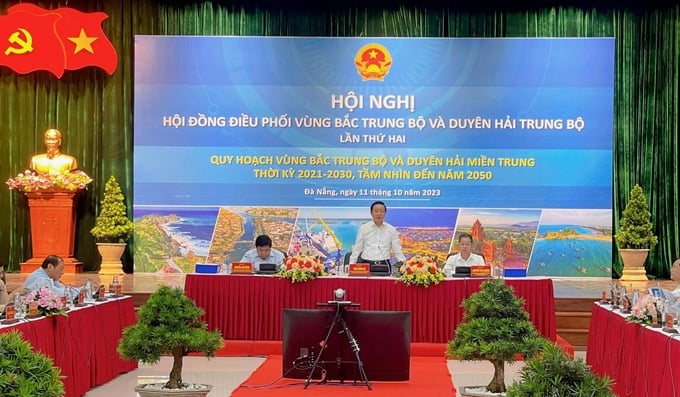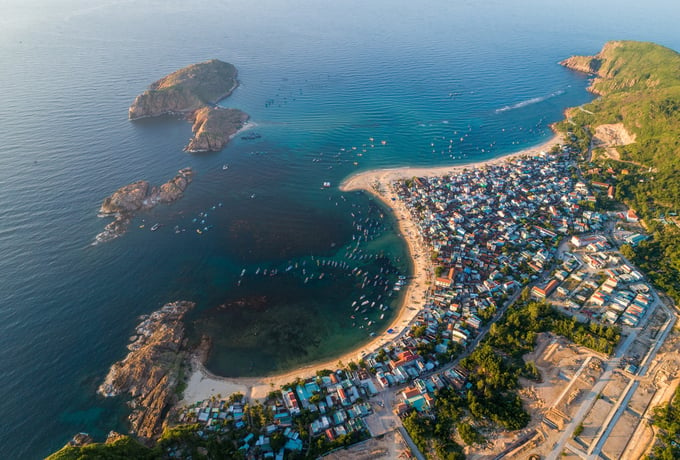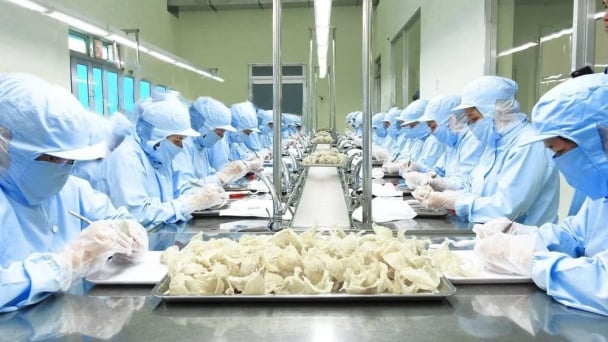May 15, 2025 | 00:09 GMT +7
May 15, 2025 | 00:09 GMT +7
Hotline: 0913.378.918
May 15, 2025 | 00:09 GMT +7
Hotline: 0913.378.918

Deputy Prime Minister Tran Hong Ha chaired the Coordination Conference for the North Central and Central Coast regions. Photo: MPI.
On October 11, Deputy Prime Minister Tran Hong Ha chaired the Coordination Conference for the North Central and Central Coast regions, with the theme "Planning for the North Central and Central Coast regions for the period 2021 - 2030, vision to 2050" in Da Nang City.
At the Conference, on behalf of the agency assigned by the Prime Minister to preside over regional planning, Minister of Planning and Investment (MPI) Nguyen Chi Dung presented the main contents of the plan.
This is a step to concretize the National Master Plan, demonstrating the major and basic orientations of national sector plans on spatial organization of development.
Planning helps pave the way, create development motivation, development potential, and new development space of the country and region and is expressed specifically on the spatial scale of each locality.
This region is identified as a particularly important strategic area in terms of politics, economics, culture, society, defence, security and foreign affairs of the whole country. This is the front of the country and the heart of the Fatherland, the gateway to the sea and the pedestal for the Central Highlands provinces.

The planning for the North Central and Central Coast regions focuses on strongly developing the marine economy combined with ensuring national defence and security at sea. Photo: VGP.
Starting from the potentials and advantages of the region, Minister of Planning and Investment Nguyen Chi Dung affirmed that the Plan offers new and groundbreaking identifications and proposals. Specifically, the planning has a vision for 2050, developing the region in accordance with the spirit of Resolution No. 26-NQ/TW of the Politburo as a region with rapid, sustainable and strong development in the marine economy.
The region has a number of large industrial, service and international cooperation centres on par with the Asian region with modern coastal economic zones, a coastal urban system that is smart, sustainable, has its own identity, and is environmentally friendly, highly resilient to natural disasters, epidemics and effective adaptation to climate change.
The planning aims to focus on investing and upgrading key infrastructure systems, especially transportation and logistics, energy, information infrastructure and digital transformation, education, training, healthcare, natural disaster prevention and control, climate change adaptation...
At the same time, focusing all resources on building transport and logistics infrastructure connecting intra-regionally and inter-regionally, focusing on maritime and railway connecting North - South, East - West, takes on the role of gateway to the sea in the Central Highlands region. Developing coastal economic space with focus and emphasis.
In particular, the Plan focuses on developing a number of driving forces and growth areas associated with major marine economic centres at regional and international levels, including 3 sub-regions: North Central sub-region (Thanh Hoa, Nghe An, Ha Tinh, Quang Binh, Quang Tri), Central Central sub-region (Thua Thien Hue, Da Nang, Quang Nam, Quang Ngai, Binh Dinh), South Central sub-region (Phu Yen, Khanh Hoa, Ninh Thuan, Binh Thuan).
The regulations' proposals aim at inter-provincial cooperation and linkage for socio-economic development such as South Thanh Hoa - North Nghe An; South Nghe An - North Ha Tinh; South Ha Tinh - North Quang Binh; Southern Phu Yen - Northern Khanh Hoa.
At the Conference, the Ministry of Planning and Investment asked for consultation and opinions from members and members of the Regional Coordination Council, relevant agencies and organizations, experts and scientists for the draft Planning for the North Central and Central Coast regions for the period 2021-2030, with a vision to 2050.
Deputy Prime Minister Tran Hong Ha emphasized that this will be the basis for all levels, sectors and localities to research, develop and implement policies, development plans, programs, and investment projects for sustainable socio-economic development of the country, the region and localities in the region.
In the recent period, the entire North Central and Central Coast regions have achieved many important results and achievements in socio-economic, security and defence matters. The average economic growth rate in the period 2005 - 2020 reached 7.3%/year, higher than the growth rate of the whole country in the same period (6.36%/year).
The economic scale of the North Central and Central Coast regions in 2020 reached VND 1,157 trillion, 3.3 times higher than in 2010. The economic structure is shifting towards service and industry as the main focus. A number of basic economic sectors, especially marine economic sectors and industries with high added value, were formed and developed; Tourism gradually became a key economic sector.
Translated by Hoang Duy

(VAN) Japan's efforts to lower the price of rice through the release of its stockpile may finally be making some progress, albeit at a snail's pace.

(VAN) U.S. tariffs are not only a 'shock', but also an opportunity for Vietnamese businesses to renew their mindset toward comprehensive development.

(VAN) As Bac Giang lychee enters the harvest season, Minister Do Duc Duy expects that the fruit will contribute greatly to agricultural exports due to standardized production and deep processing.

(VAN) Consumers have shown a preference for free-range eggs, but those farming systems are more vulnerable to biosecurity risks like bird flu.
/2025/05/09/5701-1-184335_301.jpg)
(VAN) Vietnam’s eel exports nearly doubled thanks to a mud-free farming model, opening up new prospects while still facing numerous barriers related to international standards.

(VAN) Minister Do Duc Duy warned that if production is not professionalized and supply chains are not transparent, the U.S. market could become a growth bottleneck.

(VAN) Delegating surveillance responsibilities to local authorities is a cost-saving and efficiency-boosting measure that removes a key bottleneck for enterprises, according to Director General Duong Tat Thang.